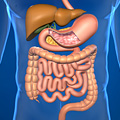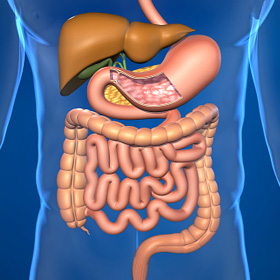
In a bowel resection, part of the large or small intestine is removed.
A bowel resection is a surgical procedure that involves removing part of the large or small intestine to treat a number of intestinal conditions such as colorectal cancer, ulcerative colitis, Crohn's disease, intestinal blockage, precancerous polyps, or other benign tumours.
When this procedure is used to treat colorectal cancer, it could either be used to prevent the spread of cancer to other areas of the body or to remove tumours that may be causing blockage or bleeding in advanced disease.
Your doctor will decide when the procedure is needed. This procedure can be repeated if necessary. It is done in a hospital using general anesthetic.
Risks and precautionsIn general, surgery and the use of anesthesia come with some risks that are associated with factors like your health and what the surgery involves. Side effects are very rare but can include trouble breathing, reactions to the anesthetic, bleeding, infection, scarring, and death.
Bowel resection is usually a straightforward and safe procedure. However, there are some risks of complications or side effects, including:
- bleeding
- blood clots
- damage to nearby tissues
- infection
- hernia (bulging tissue through the incision)
- scar tissue formation
It is important that you understand all the risks of complications and side effects of the procedure, and what you or your doctor can do to avoid them. Make sure that your doctor is aware of all your concerns.
Some people may experience complications or side effects other than those listed. Check with your doctor if you notice any symptom that worries you after your procedure.
During the testThe procedure is performed under general anesthesia in a hospital by a surgeon. It can be done with an open colectomy through a 6-inch cut in your lower abdomen, or with a laparoscopic colectomy through 3 to 6 small cuts in your abdomen using a camera. The laparoscopic approach is less invasive and has a faster recovery time.
In both approaches, your surgeon will remove the diseased part of your bowel and sew the healthy ends of the bowels together. If you do not have enough healthy tissues to reconnect the bowels, your surgeon will make an opening through your abdominal wall (called a stoma) and attach your bowel to this opening so that stool may be drained into a bag outside of your abdomen. This is called a colostomy and it may be permanent or temporary. If the surgery is being performed for colorectal cancer, nearby lymph nodes are also removed to be tested for cancer.
The procedure usually lasts about 1 to 4 hours.
Before the testIt is important that you fully understand what the procedure involves beforehand. Ask your doctor to explain the risks, benefits, and drawbacks of the procedure, and don't be shy to probe further until you are comfortable with your doctor's responses.
You may not be able to eat or drink before the procedure; follow the timing that your doctor recommends, otherwise you run the risk of the surgery being cancelled or postponed. In general, people are advised to not eat for 8 hours before the procedure and most hospitals ask that you do not drink or eat anything after midnight the night before the procedure.
Your doctor may instruct you to use enemas or laxatives to clean out your intestines. Make sure you follow their instructions.
If you are taking any prescription or over-the-counter (non-prescription) medications, supplements, or herbal products, make sure you inform your doctor or pharmacist. Ask them whether it is necessary for you to stop taking any of these medications and products before the procedure. It is also important to tell them if you have allergies to certain medications, bandages, latex, or have other medical conditions.
Plan to have someone drive you home after the procedure.
After the testBecause a bowel resection is done using general anesthesia, you will be assigned to a hospital recovery room immediately after the surgery. As the anesthesia wears off, you may feel sore, groggy, or nauseous. Nurses will be available to assist you.
After the anesthetic wears off, you will be moved to a regular ward for the rest of your stay. You will likely stay in the hospital for 3 to 7 days after surgery. Before you are released, the doctor or nurse will explain the steps you need to take to complete your recovery at home.
If a colostomy was also done, a nurse will show you how to change your ostomy bag and how to care for your stoma.
Most people recover fully from a bowel resection, but ongoing treatment may be needed to further treat your condition.

In a bowel resection, part of the large or small intestine is removed.